

Rationalism vs. Empiricism. 1.
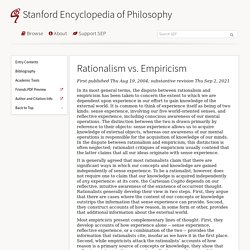
Introduction The dispute between rationalism and empiricism takes place within epistemology, the branch of philosophy devoted to studying the nature, sources and limits of knowledge. The defining questions of epistemology include the following. What is the nature of propositional knowledge, knowledge that a particular proposition about the world is true?
How Big Data is Changing Genetic Research. Big data, and its derived uses, are affecting the way we do business in every part of the world, from start-ups to Fortune 500 enterprises.1 Regardless of what field you operate in, or the size of the business, data collection, data analytics, and the understanding of that data has become more accessible, with wide-reaching impacts.
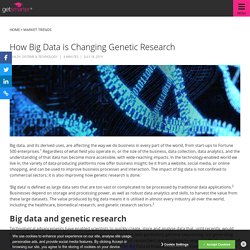
In the technology-enabled world we live in, the variety of data-producing platforms now offer business insight; be it from a website, social media, or online shopping, and can be used to improve business processes and interaction. The impact of big data is not confined to commercial sectors; it is also improving how genetic research is done. ‘Big data’ is defined as large data sets that are too vast or complicated to be processed by traditional data applications.2 Businesses depend on storage and processing power, as well as robust data analytics and skills, to harvest the value from these large datasets. Big data and genetic research. Human Genome Project Information. Completed in 2003, the Human Genome Project (HGP) was a 13-year project coordinated by the U.S.
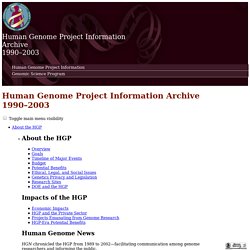
Department of Energy (DOE) and the National Institutes of Health. ‘CRISPR babies’ are still too risky, says influential panel. Editing genes in human embryos could one day prevent some serious genetic disorders from being passed down from parents to their children — but, for now, the technique is too risky to be used in embryos destined for implantation, according to a high-profile international commission.
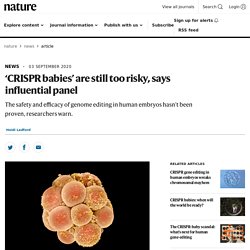
And even when the technology is mature, its use should initially be permitted in only a narrow set of circumstances, the panel says. The recommendations, released in a report on 3 September, were produced by experts in ten countries convened by the US National Academy of Medicine, the US National Academy of Sciences and the UK Royal Society. The document joins a wealth of reports compiled in recent years that have argued against using gene editing in the clinic until researchers are able to address safety worries, and the public has had a chance to comment on ethical and societal concerns. Unwanted changes Long-term effects.
The Future of Politics Is Bots Drowning Out Humans. What is a robot, really?
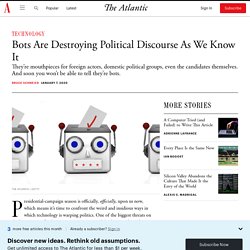
The question is more complicated than it seems. These efforts will only get more sophisticated. In a recent experiment, the Harvard senior Max Weiss used a text-generation program to create 1,000 comments in response to a government call on a Medicaid issue. These comments were all unique, and sounded like real people advocating for a specific policy position. They fooled the Medicaid.gov administrators, who accepted them as genuine concerns from actual human beings.
Center for Humane Technology. Smartphones Are Weapons of Mass Manipulation, and This Guy Is Declaring War on Them. If, like an ever-growing majority of people in the U.S., you own a smartphone, you might have the sense that apps in the age of the pocket-sized computer are designed to keep your attention as long as possible.
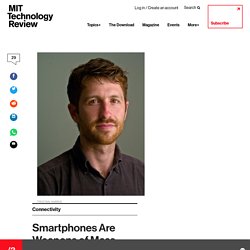
Fake News Is Unbelievably Cheap to Produce - MIT Technology Review. Judging by the state of Facebook feeds everywhere, fake news is now a very real problem—and one that appears to have equally real consequences by shaping political and social situations.

Now, a new report puts some numbers to the costs of running a fake-news campaign, revealing that a key part of the problem may be that doing so is incredibly affordable. There are some obvious steps required in launching a fake-news assault. How to bring better ethics to data science. iStock In the waning months of the Bloomberg administration, I worked for a time in a New York City Hall data group within the Health and Human Services division.
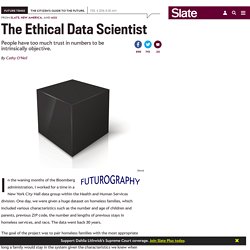
One day, we were given a huge dataset on homeless families, which included various characteristics such as the number and age of children and parents, previous ZIP code, the number and lengths of previous stays in homeless services, and race. The data went back 30 years. The goal of the project was to pair homeless families with the most appropriate services, and the first step was to build an algorithm that would predict how long a family would stay in the system given the characteristics we knew when they entered. Human Enhancement. Human enhancement is at least as old as human civilization.
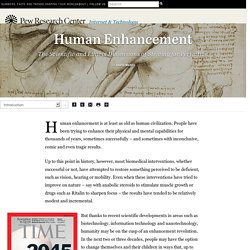
People have been trying to enhance their physical and mental capabilities for thousands of years, sometimes successfully – and sometimes with inconclusive, comic and even tragic results. Up to this point in history, however, most biomedical interventions, whether successful or not, have attempted to restore something perceived to be deficient, such as vision, hearing or mobility. Even when these interventions have tried to improve on nature – say with anabolic steroids to stimulate muscle growth or drugs such as Ritalin to sharpen focus – the results have tended to be relatively modest and incremental. But thanks to recent scientific developments in areas such as biotechnology, information technology and nanotechnology, humanity may be on the cusp of an enhancement revolution.
Both advocates for and opponents of human enhancement spin a number of possible scenarios. . — Nicholas Agar, Victoria University. Christopher Soghoian: Your smartphone is a civil rights issue. Tech Giants Grapple with the Ethical Concerns Raised by the AI Boom - MIT Technology Review. This video isn't encoded for your device With great power comes great responsibility—and artificial-intelligence technology is getting much more powerful.
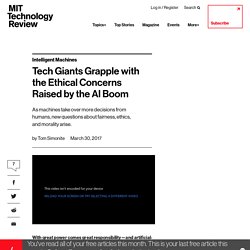
Companies in the vanguard of developing and deploying machine learning and AI are now starting to talk openly about ethical challenges raised by their increasingly smart creations. “We’re here at an inflection point for AI,” said Eric Horvitz, managing director of Microsoft Research, at MIT Technology Review’s EmTech conference this week.
“We have an ethical imperative to harness AI to protect and preserve over time.” Horvitz spoke alongside researchers from IBM and Google pondering similar issues. Las 6 diferencias entre ética y moral. Will Democracy Survive Big Data and Artificial Intelligence? Editor’s Note: This article first appeared in Spektrum der Wissenschaft, Scientific American’s sister publication, as “Digitale Demokratie statt Datendiktatur.” “Enlightenment is man’s emergence from his self-imposed immaturity. Immaturity is the inability to use one’s understanding without guidance from another.” —Immanuel Kant, “What is Enlightenment?” (1784) The digital revolution is in full swing. Everything will become intelligent; soon we will not only have smart phones, but also smart homes, smart factories and smart cities.
The field of artificial intelligence is, indeed, making breathtaking advances. It can be expected that supercomputers will soon surpass human capabilities in almost all areas—somewhere between 2020 and 2060.